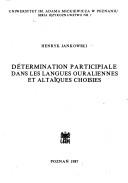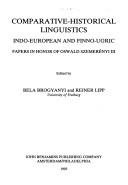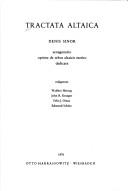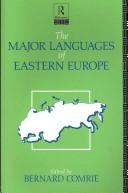| Listing 1 - 9 of 9 |
Sort by
|
Periodical
ISSN: 26771268 Year: 1973 Publisher: Szeged : Universitas Szegediensis de Attila József Nominata
Abstract | Keywords | Export | Availability | Bookmark
 Loading...
Loading...Choose an application
- Reference Manager
- EndNote
- RefWorks (Direct export to RefWorks)
Ural-Altaic languages. --- Ural-Altaic philology. --- Scythian languages --- Turanian languages --- Altaic languages --- Samoyedic languages

ISBN: 8323200572 9788323200574 Year: 1987 Volume: 7
Abstract | Keywords | Export | Availability | Bookmark
 Loading...
Loading...Choose an application
- Reference Manager
- EndNote
- RefWorks (Direct export to RefWorks)
Ural-Altaic languages --- Participle --- Determiners --- -Ural-Altaic languages --- -Scythian languages --- Turanian languages --- Altaic languages --- Samoyedic languages --- -Participle --- Scythian languages --- Ural-Altaic languages - Participle --- Ural-Altaic languages - Determiners

ISSN: 03040763 ISBN: 9027235988 1556191596 9786613312976 1283312972 9027276986 9789027276988 9789027235985 9781556191596 9781283312974 6613312975 Year: 1993 Volume: 97 Publisher: Amsterdam ; Philadelphia : J. Benjamins Pub. Co.,
Abstract | Keywords | Export | Availability | Bookmark
 Loading...
Loading...Choose an application
- Reference Manager
- EndNote
- RefWorks (Direct export to RefWorks)
This volume offers an important contribution to the comparative historical study of languages. Most of the articles deal with topics concerning the Indo-European proto-language as well as the individual languages descended from it. Essays in Finno-Ugric philology complete the volume. The book is divided in 8 sections: I. Indo-European, II. Anatolian, III. Indic, IV. Iranian and Armenian, V. Celtic, VI. Germanic Languages, VII. Slavic and Albanian, VIII. Fennougrica and Altaica.
Indo-European languages --- Ural-Altaic languages --- Indo-European languages. --- Ural-Altaic languages. --- Scythian languages --- Turanian languages --- Altaic languages --- Samoyedic languages --- Aryan languages --- Indo-Germanic languages

ISBN: 3447017988 Year: 1976 Publisher: Wiesbaden Harrassowitz
Abstract | Keywords | Export | Availability | Bookmark
 Loading...
Loading...Choose an application
- Reference Manager
- EndNote
- RefWorks (Direct export to RefWorks)
Ural-Altaic languages. --- Sinor, Denis. --- S01/0800 --- China: Bibliography and reference--"Festschrifte" and other works of a miscellaneous nature --- Ural-Altaic languages --- Scythian languages --- Turanian languages --- Altaic languages --- Samoyedic languages --- Sinor Dénes --- Denis Sinor --- Dannisi Sainuo --- 丹尼斯・塞诺
Book
ISBN: 9042031360 9789042031364 9789042031357 9042031352 Year: 2010 Publisher: Amsterdam New York, NY Rodopi
Abstract | Keywords | Export | Availability | Bookmark
 Loading...
Loading...Choose an application
- Reference Manager
- EndNote
- RefWorks (Direct export to RefWorks)
The red thread which runs through this book is a quest for relative chronology of linguistic developments. The probability of a reconstruction can be judged against the background of the transitions which it implies for the linguistic system as a whole. The reconstructions are always bottom-up, never top-down. It follows that the chapters on Germanic can be read without reference to the Indo-European background and that the Indo-Uralic part of the book can be left out of consideration if one does not want to look beyond Proto-Indo-European. The initial chapters of the book offer an introduction to the background and methodology of the reconstructions with a discussion of the spread of the Indo-Europeans, the role of general linguistics in linguistic reconstruction, the nature of mixed languages, the origin of the Goths, the relations between Indo-European, Uralic and Caucasian languages, and the structure and development of Proto-Indo-European. The following chapters deal with the phonology and morphosyntax of Indo-European, Greek, Indo-Iranian and Tocharian. These are followed by a discussion of Germanic phonology, verb classes, verbal and nominal inflexion, and specific issues in English, German and Scandinavian languages. After a short treatment of Albanian, Armenian, Balto-Slavic and Italo-Celtic topics, the volume is concluded with a discussion of Anatolian and Indo-Uralic phonology and morphosyntax. The book is of interest to students of Germanic, Indo-European and historical linguistics.
Germanic languages --- Indo-European languages --- Ural-Altaic languages --- Phonology. --- Scythian languages --- Turanian languages --- Sievers' law --- Verner's law --- Altaic languages --- Samoyedic languages --- Germanic languages. --- Indo-European languages. --- Uralic languages. --- Uralian languages --- Aryan languages --- Indo-Germanic languages --- Teutonic languages --- Uralic languages --- History. --- Grammar, Historical --- Phonology, Historical
Book
ISBN: 3319229907 3319229915 Year: 2016 Publisher: Cham : Springer International Publishing : Imprint: Springer,
Abstract | Keywords | Export | Availability | Bookmark
 Loading...
Loading...Choose an application
- Reference Manager
- EndNote
- RefWorks (Direct export to RefWorks)
This volume combines psycholinguistic experiments with typological investigations in order to provide a comprehensive exploration of the linguistic structure of verb-number agreement in bilingual speakers, with a particular focus on the Turkish language. It takes as its starting point the question of which linguistic structures pose difficulties for bilingual speakers, and then proceeds to evaluate the question by using the interface phenomenon of optional verb number agreement. In doing so, this volume investigates how the bilingual mind handles grammatical structures that demand high processing sources, working towards a processing-based linguistic framework for the bilingual mind. Beginning with a thorough survey of the current research of the interface phenomenon in the bilingual mind, the volume then proceeds to present two separate studies on each linguistic interface type, namely semantics-syntax interface and syntax-pragmatics interface, thus filling a number of gaps in the bilingualism research with regards to the interface phenomenon The results and conclusions of these studies are then integrated with current knowledge and research from the field within a theoretical and processing-based framework in order to explore new psycholinguistic insights for the bilingual mind, specifically the conclusion that the grammar of bilingual speakers is shaped according to cross linguistic tendencies. Ultimately, it provides a unified account and a comprehensive conclu sion regarding the non-native-like patterns in grammar of bilingual speakers. Serving as a fascinating and timely resource, Competing Structures in the Bilingual Mind: An Investigation of Optional Verb Number Agreement will appeal to bilingualism researchers, clinical linguists, cognitive scientists, experimental linguists, and any linguist specializing in Turkic or Altaic languages.
Philology & Linguistics --- Languages & Literatures --- Bilingualism --- Psycholinguistics. --- Pschycological aspects. --- Language, Psychology of --- Language and languages --- Psychology of language --- Speech --- Psychological aspects --- Psychology --- Linguistics --- Thought and thinking --- Languages in contact --- Multilingualism --- Grammar, Comparative and general. --- Consciousness. --- Ural-Altaic languages. --- Syntax. --- Cognitive Psychology. --- Uralic-Altaic Languages. --- Scythian languages --- Turanian languages --- Altaic languages --- Samoyedic languages --- Apperception --- Mind and body --- Perception --- Philosophy --- Spirit --- Self --- Comparative grammar --- Grammar --- Grammar, Philosophical --- Grammar, Universal --- Philosophical grammar --- Philology --- Grammar, Comparative --- Cognitive psychology. --- Psychology, Cognitive --- Cognitive science --- Grammar, Comparative and general Syntax --- Syntax

ISBN: 041505771X 9780415057714 9780203216149 9781134932603 9781134932641 9781134932658 9781138429291 Year: 1990 Publisher: London Routledge
Abstract | Keywords | Export | Availability | Bookmark
 Loading...
Loading...Choose an application
- Reference Manager
- EndNote
- RefWorks (Direct export to RefWorks)
Linguistics --- Eastern and Central Europe --- Slavic languages --- Ural-Altaic languages --- Langues slaves --- Langues ouralo-altaïques --- Europe, Eastern --- Europe de l'Est --- Languages --- Langues --- #KVHA:Linguistiek; Oost-Europa --- Language and culture --- Language and history --- Slavic languages. --- Ural-Altaic languages. --- Oeraalse talen. --- Slavische talen. --- Talen. --- Turkse talen. --- Langues ouralo-altaïques --- Scythian languages --- Turanian languages --- Altaic languages --- Samoyedic languages --- Balto-Slavic languages --- Slavonic languages --- Indo-European languages --- History and language --- Linguistics and history --- History --- Culture and language --- Culture --- Languages. --- Europe [Eastern ] --- Language and culture - Europe, Eastern --- Language and history - Europe, Eastern --- Europe, Eastern - Languages
Book
ISBN: 331990163X 3319901656 Year: 2018 Publisher: Cham : Springer International Publishing : Imprint: Springer,
Abstract | Keywords | Export | Availability | Bookmark
 Loading...
Loading...Choose an application
- Reference Manager
- EndNote
- RefWorks (Direct export to RefWorks)
This book brings together work on Turkish natural language and speech processing over the last 25 years, covering numerous fundamental tasks ranging from morphological processing and language modeling, to full-fledged deep parsing and machine translation, as well as computational resources developed along the way to enable most of this work. Owing to its complex morphology and free constituent order, Turkish has proved to be a fascinating language for natural language and speech processing research and applications. After an overview of the aspects of Turkish that make it challenging for natural language and speech processing tasks, this book discusses in detail the main tasks and applications of Turkish natural language and speech processing. A compendium of the work on Turkish natural language and speech processing, it is a valuable reference for new researchers considering computational work on Turkish, as well as a one-stop resource for commercial and research institutions planning to develop applications for Turkish. It also serves as a blueprint for similar work on other Turkic languages such as Azeri, Turkmen and Uzbek.
Natural language processing (Computer science) --- Turkish language --- Translating. --- NLP (Computer science) --- Artificial intelligence --- Electronic data processing --- Human-computer interaction --- Semantic computing --- Computational linguistics. --- Natural language processing (Computer science). --- Ural-Altaic languages. --- Artificial intelligence. --- Computational Linguistics. --- Signal, Image and Speech Processing. --- Natural Language Processing (NLP). --- Uralic-Altaic Languages. --- Artificial Intelligence. --- AI (Artificial intelligence) --- Artificial thinking --- Electronic brains --- Intellectronics --- Intelligence, Artificial --- Intelligent machines --- Machine intelligence --- Thinking, Artificial --- Bionics --- Cognitive science --- Digital computer simulation --- Logic machines --- Machine theory --- Self-organizing systems --- Simulation methods --- Fifth generation computers --- Neural computers --- Scythian languages --- Turanian languages --- Altaic languages --- Samoyedic languages --- Automatic language processing --- Language and languages --- Language data processing --- Linguistics --- Natural language processing (Linguistics) --- Applied linguistics --- Cross-language information retrieval --- Mathematical linguistics --- Multilingual computing --- Data processing --- Signal processing. --- Image processing. --- Speech processing systems. --- Computational linguistics --- Electronic systems --- Information theory --- Modulation theory --- Oral communication --- Speech --- Telecommunication --- Singing voice synthesizers --- Pictorial data processing --- Picture processing --- Processing, Image --- Imaging systems --- Optical data processing --- Processing, Signal --- Information measurement --- Signal theory (Telecommunication)
Book
ISBN: 3030517764 3030517756 Year: 2020 Publisher: Cham : Springer International Publishing : Imprint: Palgrave Macmillan,
Abstract | Keywords | Export | Availability | Bookmark
 Loading...
Loading...Choose an application
- Reference Manager
- EndNote
- RefWorks (Direct export to RefWorks)
Sensitivity to languages is central to any serious analysis of inequality between Global North and Global South. Development NGOs and Languages is a long overdue intervention in this area, exploring urgent questions of interpreting and translation in the work of international NGOs. Drawing on extensive geographical and institutional case studies, the book recasts development as an inherently multilingual operation. The result is essential reading for scholars and practitioners in this field. – Charles Forsdick, AHRC Theme Leadership Fellow, Translating Cultures This book addresses, for the first time, the question of how development NGOs attempt to 'listen' to communities in linguistically diverse environments. NGOs are under increasing pressure to demonstrate that they 'listen' to the people and communities that they are trying to serve, but this can be an immensely challenging task where there are significant language and cultural differences. However, until now, there has been no systematic study of the role of foreign languages in development work. The authors present findings based on interviews with a wide range of NGO staff and government officials, NGO archives, and Southern NGOs in Malawi, Peru and Kyrgyzstan.They suggest ways in which NGOs can reform their language policies to listen to the recipients of aid more effectively. Angela M. Crack is Reader in Civil Society at the University of Portsmouth. Her publications focus on her research specialism of NGO accountability, particularly regarding issues of self-regulation and accountability to beneficiaries. Hilary Footitt is Hon. Research Fellow in the Department of Languages and Cultures, University of Reading, and PI for the AHRC funded project: 'The Listening Zones of NGOs: Languages and Cultural Knowledge in development programmes'. She has written widely on languages in war and conflict, and is the co-editor of the Palgrave ‘Languages at War’ series. Wine Tesseur is a Marie Skłodowska-Curie and Irish Research Council postdoctoral Fellow in the School of Applied Language and Intercultural Studies at Dublin City University, where she conducts research in collaboration with the Irish NGO GOAL on ‘Translation as Empowerment: Translation as a contributor to human rights in the Global South‘. Her research specialism is translation policies in NGOs.
Non-governmental organizations. --- INGOs (International agencies) --- International non-governmental organizations --- NGOs (International agencies) --- Nongovernmental organizations --- Organizations, Non-governmental (International agencies) --- Private and voluntary organizations (International agencies) --- PVOs (International agencies) --- International agencies --- Nonprofit organizations --- Economic policy. --- Economic development. --- Social change. --- Economic development—Environmental aspects. --- Linguistic minorities. --- Ural-Altaic languages. --- Development Policy. --- Development and Social Change. --- Development and Sustainability. --- Minority Languages. --- Uralic-Altaic Languages. --- Scythian languages --- Turanian languages --- Altaic languages --- Samoyedic languages --- Minority languages --- Language and languages --- Minorities --- Sociolinguistics --- Change, Social --- Cultural change --- Cultural transformation --- Societal change --- Socio-cultural change --- Social history --- Social evolution --- Development, Economic --- Economic growth --- Growth, Economic --- Economic policy --- Economics --- Statics and dynamics (Social sciences) --- Development economics --- Resource curse --- Economic nationalism --- Economic planning --- National planning --- State planning --- Planning --- National security --- Social policy --- Political aspects --- Minoritized languages
| Listing 1 - 9 of 9 |
Sort by
|

 Search
Search Feedback
Feedback About UniCat
About UniCat  Help
Help News
News